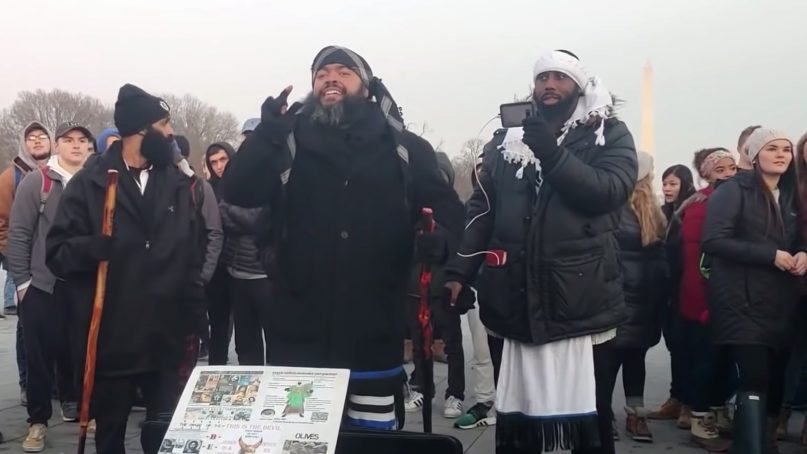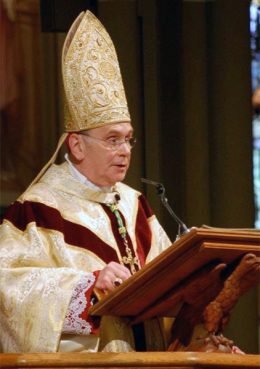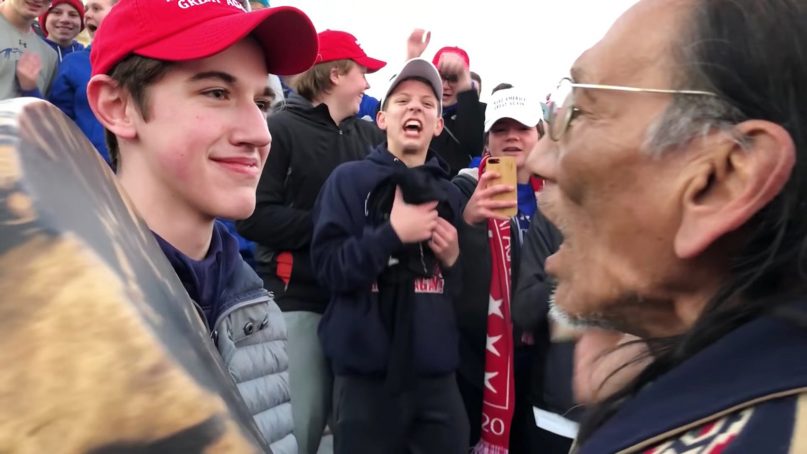(RNS) — A third-party investigation into a controversial January encounter between a Native American group and students from a Kentucky Catholic high school concluded that there is “no evidence” of racist or offensive statements by the students.
Yet the same report, which was released on Wednesday (Feb. 13), also conceded that some students from Covington Catholic High School responded to a Native American man drumming and singing by performing the “tomahawk chop” used by some sports teams — an action many Native Americans find offensive.
Chase Iron Eyes, organizer of the Indigenous Peoples March, issued a statement in response to the report on Wednesday evening. He said he wasn’t surprised that the report “would fail to hold the students accountable for their behavior that day” along with parents and guardians. He also expressed frustration with a culture he described as lacking understanding about indigenous people.
“We are living in a nation where our president makes jokes about the Trail of Tears and Wounded Knee,” the statement read in part. “It’s possible that people within the Covington Catholic community are not willingly expressing racism, but as is clear from the report’s findings, there’s a lack of understanding about the racism inherent in the tomahawk chop.”
Bishop Joseph Foys, who heads up the Diocese of Covington that oversees the school, struck a very different tone in a statement posted on the diocesan website.
“I am pleased to inform you that my hope and expectation expressed in my letter to you of 25 January that the results of our inquiry into the events of 18 January at the Lincoln Memorial in Washington, D.C. would ‘exonerate our students so that they can move forward with their lives’ has been realized,” Foys said.
Foys also said the firm that completed the report has no ties to the diocese or the school.
The report was commissioned by the Diocese of Covington after video of the incident went viral. Hours after the encounter, social media was awash with several clips depicting various parts of what transpired between groups near the Lincoln Memorial and the students, who had attended the anti-abortion March for Life demonstration earlier that day.
One video showed the students, many of whom were wearing “Make America Great Again” hats, being berated by a group of Black Hebrew Israelites before responding by loudly shouting school chants.

A group of men interacts with Covington Catholic High School students and other people on the National Mall on Jan. 18, 2019, in Washington. The group is thought to be a sect of Black Hebrew Israelites. Video screenshot
Another video showed the students being approached by Nathan Phillips, a Native American man who had attended the Indigenous Peoples March, also that day. Phillips later said he was trying to de-escalate the situation by chanting and playing a drum. He ended up standing face-to-face with a student later identified as Nick Sandmann.
Video of Phillips and Sandmann staring at each other, as the two were surrounded by Covington students, went viral.
A social media firestorm that played out over the weekend after the incident resulted in the diocese and others initially condemning the students’ behavior, only to later re-evaluate their approach and call for an investigation.
The subsequent report, which was prepared by Greater Cincinnati Investigation Inc. and dated Feb. 11, employed four investigators who pored over hours of video and interviews with witnesses. The report indicates they were not able to interview Sandmann or Phillips.
Investigators reported they found “no evidence of offensive or racist statements by students to Mr. Phillips or members of his group,” nor did they find evidence that the students chanted “Build the wall,” as Phillips initially claimed they did.
The report did note that some students used the “tomahawk chop,” but it was not immediately clear whether investigators did not consider the action a “statement” or whether they did not consider it offensive or racist.

Bishop Joseph Foys in Covington, Ky., in 2013. Photo courtesy of Creative Commons
The report also acknowledged a video of young men shouting at two women but said investigators could not confirm whether the students were from Covington. It was not immediately clear if investigators reached out to the woman who originally posted the video on Twitter.
In his statement, Foys defended the actions of the Covington students.
“Taking everything into account, our students were placed in a situation that was at once bizarre and even threatening,” Foys wrote. “Their reaction to the situation was, given the circumstances, expected and one might even say laudatory. These students had come to Washington, D.C. to support life. … Their stance there was surely a pro-life stance. I commend them.”
Since the incident, Phillips has offered to meet with the students and church officials to discuss the encounter, hoping to transform it into a “teachable moment.”
Religion News Service reached out to the diocese but did not immediately hear back.





